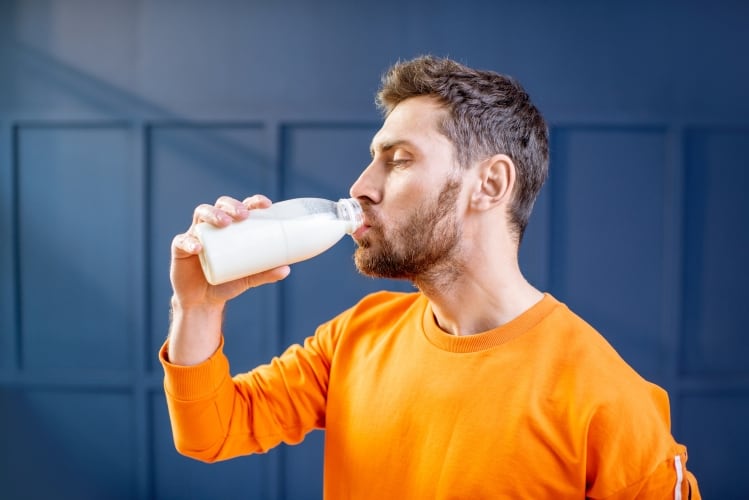Based on in-depth research from ADM’s proprietary Outside Voice consumer insights platform, the company provides a breakdown of each growth space poised for takeoff in the new year, which can be used by consumer brands to fuel product innovation.
Brad Schwan, vice president of category marketing for ADM, said, “Consumers today continue to navigate a tumultuous environment that has uprooted every aspect of their lives. This has led forward-thinking brands to develop new solutions purpose-built to help consumers establish a sense of normality for themselves, their families and their pets. We’re seeing everything from foods, feeds and beverages that promote gut health to plant-based meat and dairy alternatives to biodegradable packaging.”
ADM has highlighted what it sees as the eight key consumer trends fueling current and future global growth that are shaping the company’s innovation, renovation, and development platforms.
Nourishment for the whole self
Consumers want to be more proactive about supporting their mind and body through a balanced approach to diet and lifestyle. While this is a long-term trend, the recent global pandemic has placed renewed interest on mental well-being, with many looking for more effective ways to cope with stress and anxiety. Wholesome nutrition is one important way consumers are looking to support their holistic well-being. ADM Outside Voice found 37% of global consumers expect the snacks they eat to improve their mental well-being.
Plant-based lifestyles
A flexitarian approach to eating has become mainstream as consumers look to functional, wholesome, plant-based nutrition to support healthy, environmentally friendlier lifestyles. ADM said according to the Boston Consulting Group and Blue Horizon Corporation, Food for Thought, The Protein Transformation Report, 2021, it is expected alternative proteins will very likely account for 11% of the total protein market in 2035. This is being fueled, in part, by Covid-19, which has accelerated interest in plant-based, as a health-forward alternative for consumers who are paying close attention to their body’s nutritional needs. Food and beverage brands, in response, are broadening the landscape of nutrient-dense plant-based options for consumers, aiming to meet their growing demand for products that are sustainable, health and wellness oriented and safe.
Microbiome as the root of wellness
Awareness of the microbiome as central to wellness has grown over time. Data from ADM Outside Voice indicated 58% of global consumers are aware of the potential benefits bacteria in the digestive system can have on their overall health. Today’s consumers are looking for foods, beverages and supplements supporting gut health and overall well-being. Linked by consumers to immune function, aspects of metabolic health and even mood, mental acuity and feeling energized, consumers’ approach to supporting a healthy gut is evolving from reactive (seeking foods to alleviate discomfort) to proactive (tailored and customized pre-, pro- and postbiotic solutions), as they strive to achieve greater empowerment over their personal health and well-being.
Clean & transparent sourcing
Consumers now demand ‘clean label’ products, which they consider to consist of real, kitchen-level ingredients, ADM said, adding today’s shopper is seeking out foods and beverages containing real, simple ingredients to help promote a healthy, sustainable lifestyle. This has led to a desire for transparency across the entire product life-cycle, from how it is made to how it is packaged, and beyond. This is especially true during Covid-19, with consumers placing an increased emphasis on learning where their food comes from and trying to ensure the health and safety of themselves, their families, their pets and their communities. As consumers become more sophisticated in their understanding of the products they consume, 58% of global consumers say they will be more attentive to locality claims as a result of Covid-19 (FMCG Gurus: How Has COVID-19 Changed Consumer Behavior).
Humanization of pets
ADM said pets are more commonly seen as part of the family – a trend present over time but accelerated in strength during the pandemic. This extends to what their pets eat, with many pet parents transposing their purchasing values and preferences onto pet food. There has been a 41% increase in 'all natural' pet foods launched globally (Mintel, The Future of Pet Food 2021 report). ADM Outside Voice also found 30% of global pet owners spent a significant amount of time researching the best food options in the last year.
Precise & responsible animal feeding
ADM said the interconnectedness of the animal product supply chain is top of mind for today’s consumer, with an increased demand for optimized feed solutions supporting human and animal nutrition in an efficient, environmentally-friendly manner for a range of animal species. This is driving brands to begin providing digital documentation explaining how the animal was raised, particularly related to its consumption of antibiotics and/or growth hormones. Nearly half (49%) of consumers are willing to pay a premium for products with high quality assurances and verifiable safety standards, according to a 2020 Nielsen study.
Sustainable goodness
Consumers see sustainability as a moral imperative as they connect it to what is right and ethical, their community and the environment, ADM said. This has sparked demand for ethical production and sustainable sourcing practices – such as regenerative agriculture and carbon negative production to protect the food supply of the future. Brands are responding by taking positions on environmental matters, aiming to reflect their commitments to increasing the sustainability of their production and distribution systems.
Advanced renewables & bio-solutions
Today’s consumers are more conscious of the environmental impact of their consumption and the food system at large, with a specific focus on the use of finite materials and physical waste, ADM said. With 38% of global consumers being willing to pay more for products made with sustainable materials (FMCG Gurus: How Has COVID-19 Changed Consumer Behavior), conscientious consumers are paying close attention to seek food, personal care and home care products that support the needs of their families, the environment and their local communities. And, consumers increasingly believe companies should take greater responsibility for reducing waste and energy use from development to disposal.

